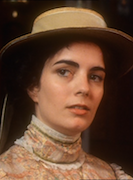Monday, July 13, 1981.
THE GETTING OF WISDOM. Written by Eleanor Witcombe, based on the 1910 novel by Henry Handel Richardson (Ethel Richardson Robertson). Music uncredited. Directed by Bruce Beresford. Running time: 101 minutes. Mature entertainment.
BRUCE BERESFORD SPECIALIZES IN extraordinary characters. His career as a feature film director began with a cheeky, cheerful comedy called The Adventures of Barry McKenzie (1971) and its sequel Barry McKenzie Holds His Own (1974).
He’s best known for his most recent film, the award-winning Breaker Morant (1980). According to Bay Theatre manager Maurice Bilovus, Breaker’s Vancouver run was the longest in Canada, and second only to New York in North America.
Now comes Beresford’s The Getting of Wisdom. Made in 1977, it introduces audiences to the extraordinary Laura Tweedle Rambotham, played by an extraordinary young actress, Susannah Fowle.
Like Sybylla Melvyn in 1979’s My Brilliant Career, Laura is a child of the 19th century Australian outback. Her widowed mother (Kay Eklund) is a hard-working rural postmistress who dreams of better things for her daughter.
The time is 1897. Mrs. Rambotham believes that education is the key to "better things,” and has done everything she can to prepare her bright, outgoing daughter for academic success. The film opens with Laura leaving for Melbourne’s exclusive Presbyterian Ladies' College.
Like My Brilliant Career, The Getting of Wisdom is based on a semi-autobiographical novel. Like Career author Miles Franklyn, Ethel Richardson Robertson (1870-1946) hid behind a male pseudonym. Her book, published in 1910, was credited to “Henry Handel Richardson.”
Like Career, Wisdom was adapted for the screen by a woman. Eleanor Witcombe has provided director Beresford with a lean, to-the-point tale of a young woman "wised up” to how the world works.
Wisdom received its Canadian premiere in 1978 at Toronto’s Festival of Festivals. At the time, I thought that it was an uncommonly fine film, a movie about maturation that was unsentimental and beguilingly beautiful at one and the same time.
When Career opened here, I appreciated its passion and energy, but felt that, on balance, Wisdom was the better picture. Viewing Wisdom again on the opening night of the Varsity Festival of International Films, I came away convinced.
Laura's story is told in three acts, divisions that correspond to her school terms. In the first she is unsophisticated, unselfconscious and painfully vulnerable. Her talents and accomplishments count for less than her manners.
Desperate to belong, she entertains her second term classmates with a manufactured love affair. All goes well until she is found out, and then she learns the difference between being noteworthy and being notorious.
During the third term, she gains some firsthand knowledge of love and its power to alter lives. She has already been the object of the unrequited passion of classmate Annie Jones (Alix Longman), and now she becomes involved in a doomed affair with attractive upper classwoman Evelyn Souttar (Hilary Ryan).
Throughout, Laura is learning. No stereotyped heroine, Laura is a fully rounded, fully realized human being. Intelligent and talented, she is also ambitious and prideful.
She can be both sensitive and self-centred. As played by the dimpled, dark-haired Fowle, Laura is a seeker and a survivor, a young woman with practical ideals who plays to win.
Lovely to look at, The Getting of Wisdom is a finely acted, multi-faceted gem of a film.
The above is a restored version of a Province review by Michael Walsh originally published in 1981. For additional information on this archived material, please visit my FAQ.
Afterword: I might have been more clear about that screenwriting credit. I said that “Like (My Brilliant) Career, Wisdom was adapted for the screen by a woman.” What I should have said was “the same woman.” Both director Gillian Armstrong and Bruce Beresford benefited from their collaboration with an Antipodean arts legend, the then-54-year-old Eleanor Witcombe. Born in 1923 in rural South Australia, her own coming-of-age years were similar to those of Laura and Sybylla. Like Sybylla, she worked as a governess and aspired to be a writer. Her medium would be the performing arts, where she found her voice as a playwright, then as a television and film screenwriter. Her biographical note in The Oxford Companion to Australian Film asserts that she was “the pre-eminent Australian screenwriter of adaptations.” Today, in the era of fourth-wave feminism, Witcombe’s own brilliant career would make a fine feature film (or, perhaps, a TV mini-series) for that chronicler of extraordinary characters, Bruce Beresford.
The Aussie A-Team: Our Australia Day additions to the Reeling Back archive include director Gillian Armstrong’s 1979 feature My Brilliant Career, as well as Bruce Beresford’s teen trilogy, The Getting of Wisdom (1978), Puberty Blues (1981) and The Fringe Dwellers (1986).
